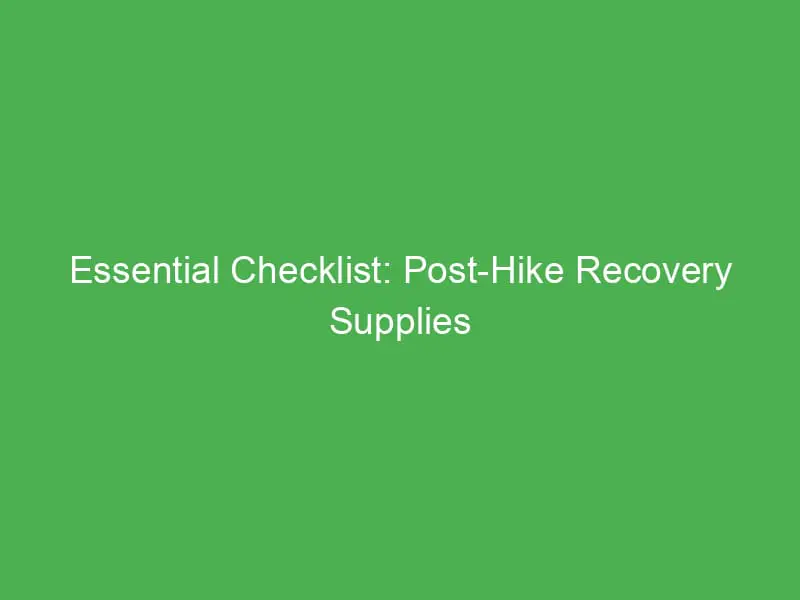After an exhilarating hike, the body craves attention and care. Post-hike recovery is crucial for restoring energy and preventing injuries, especially for those who love to explore the great outdoors. Having the right supplies on hand can make all the difference in how quickly one bounces back and prepares for the next adventure.
This checklist covers essential recovery supplies that every hiker should consider. From hydration to nutrition and muscle relief, these items ensure a smooth transition from trail to recovery. Whether it’s a quick day hike or an extended trek, being prepared with the right tools can enhance the overall experience and keep the spirit of adventure alive.
Importance Of Post-Hike Recovery
Post-hike recovery plays a crucial role in enhancing performance and maintaining overall health. Using the right recovery supplies helps replenish energy, support muscle repair, and minimise the risk of injury.
Benefits Of Recovery Supplies
- Hydration: Replenishing fluids lost during a hike prevents dehydration, which can lead to fatigue and decreased performance.
- Nutrition: Consuming balanced snacks or meals rich in carbohydrates and proteins supports energy restoration and muscle repair.
- Muscle Relief: Applying items like foam rollers or compression garments aids in reducing muscle soreness and speeding up recovery.
- Restoration of Electrolytes: Electrolyte supplements help restore vital minerals lost through sweat, crucial for muscle function and recovery.
- Injury Prevention: Engaging in proper cool-down routines and stretching aids in preventing stiffness and injuries in future hikes.
Common Recovery Mistakes
- Skipping Hydration: Neglecting to drink adequate fluids post-hike can delay recovery and increase soreness.
- Inadequate Nutrition: Failing to consume enough proteins and carbohydrates within an hour of completing a hike can hinder muscle recovery.
- Overlooking Rest: Not allowing sufficient time for rest can lead to fatigue, making subsequent hikes more challenging.
- Ignoring Signs of Pain: Dismissing persistent discomfort may result in more serious injuries requiring medical attention.
- Rushing the Stretching Process: Skipping or rushing through cool-down stretches can result in tight muscles and slower recovery times.
Essential Recovery Supplies
Post-hike recovery relies on essential supplies that support hydration and nutrition. Preparing with the right items ensures efficient recovery and optimal performance.
Hydration Essentials
Replenishing fluids post-hike is crucial. Dehydration affects recovery time and overall well-being. Key hydration essentials include:
- Water: Hydration must begin immediately after the hike. Drink sufficient water to restore fluid levels.
- Electrolyte Drinks: Choose drinks with sodium, potassium, and magnesium to replace lost electrolytes. Options include sports drinks or electrolyte tablets.
- Coconut Water: A natural source of electrolytes, it aids hydration effectively.
- Reusable Water Bottles: Opt for lightweight, insulated bottles to keep fluids cool and encourage regular intake.
These supplies promote quick hydration and enhance recovery experiences.
Nutrition Options
Balanced nutrition boosts energy restoration and muscle repair. Essential nutrition options consist of:
- Protein Bars: Use nutrient-dense bars containing protein and healthy fats for muscle recovery.
- Trail Mix: Select a mix of nuts, seeds, and dried fruits for a quick energy boost.
- Fruits: Fresh options, such as bananas and oranges, replenish vitamins and provide instant energy.
- Recovery Shakes: Use shakes rich in protein and carbohydrates to support muscle recovery and hydration.
- Wholegrain Snacks: Incorporate wholegrain cookies or crackers for sustained energy release.
These nutritional supplies maximise recovery efficiency, supporting optimal performance for future hikes.
Essential Post-Hike Recovery Gear to Speed Up Muscle Recovery
Having the right gear for post-hike recovery enhances comfort and supports the body in recuperation. Essential recovery items include clothing designed for rest and equipment that aids in physical recovery.
Recovery Clothing
Recovery clothing plays a crucial role in maintaining body temperature and aiding muscle recovery. Key items include:
- Compression garments: These can boost circulation, which aids in reducing soreness and improving recovery time.
- Moisture-wicking base layers: These help keep the body dry by drawing sweat away from the skin, ensuring comfort during the recovery phase.
- Soft, breathable fabrics: Comfortable materials allow for relaxation and provide a sense of relief to fatigued muscles.
- Warm layers: Fluffy fleece jackets or thermal leggings support muscle warmth and prevent stiffness during rest.
Supporting Equipment
Supporting equipment provides necessary assistance and enhances post-hike recovery. Recommended tools consist of:
- Foam rollers: These assist in self-myofascial release, helping alleviate muscle tightness and soreness.
- Elastic resistance bands: These can serve for gentle stretching to improve flexibility without straining the muscles.
- Massage balls: These target specific muscles for relief from knots or tension.
- Heat packs or cold packs: These offer contrasting therapies for muscle recovery; heat relaxes tight muscles while cold reduces inflammation.
Equipping with these items ensures an effective recovery process after hiking adventures.
Tips For Effective Recovery
Post-hike recovery is crucial for restoring strength and preventing injuries. Implementing effective recovery practices ensures optimal performance for future hikes.
Stretching And Mobility
Stretching post-hike promotes flexibility and reduces muscle soreness. Focus on the following key stretches:
- Hamstring stretch: Hold for 20-30 seconds on each leg to alleviate tightness.
- Quadriceps stretch: Stand and pull the ankle towards the glutes, ensuring balance.
- Hip flexor stretch: Lunge forward while keeping the back straight to increase hip mobility.
- Calf stretch: Press against a wall with one foot back for a deeper stretch.
Incorporating mobility exercises, such as gentle yoga poses or dynamic movements, enhances overall recovery and can significantly improve range of motion.
Rest And Relaxation Techniques
Rest plays a vital role in recovery. Prioritise these techniques to enhance relaxation:
- Sleep quality: Aim for 7-9 hours of uninterrupted sleep to facilitate muscle repair.
- Breathing exercises: Practice deep, diaphragmatic breathing to reduce stress and promote relaxation.
- Meditation: Engage in mindfulness meditation for mental clarity and stress relief.
- Gentle activities: Consider light walking or stretching to prevent stiffness while aiding muscle recovery.
Utilising these techniques fosters a restorative environment for the body and mind following a hike.
Key Takeaways
- Importance of Post-Hike Recovery: Proper recovery enhances performance, supports muscle repair, and minimises injury risk after hiking.
- Essential Recovery Supplies: Key supplies include hydration essentials (such as water and electrolyte drinks) and nutrition options (like protein bars and fruits) to replenish energy and aid recovery.
- Avoid Common Recovery Mistakes: Skipping hydration, inadequate nutrition, and overlooking rest are common pitfalls that can hinder recovery and increase soreness.
- Invest in Recovery Gear: Compression garments, foam rollers, and moisture-wicking clothing are vital for comfort and effective recovery after hiking adventures.
- Incorporate Stretching and Mobility: Post-hike stretching and mobility exercises are essential to improve flexibility and reduce muscle soreness.
- Prioritise Rest and Relaxation: Ensuring quality sleep and engaging in relaxation techniques like meditation can significantly enhance the recovery process.
Conclusion
Post-hike recovery is essential for maintaining peak performance and overall well-being. By equipping oneself with the right recovery supplies and tools, hikers can significantly enhance their recovery process. Prioritising hydration nutrition and muscle relief not only aids in quicker recuperation but also sets the stage for future adventures.
Incorporating effective recovery strategies such as stretching and mindfulness can further optimise the benefits of these supplies. As outdoor enthusiasts embrace the joys of hiking they should remember that proper recovery is just as important as the hike itself. Investing time and effort in recovery ensures a healthier more enjoyable experience on the trails.
Frequently Asked Questions
What is post-hike recovery and why is it important?
Post-hike recovery refers to the practices and tools used to restore energy and prevent injuries after hiking. It is important because proper recovery enhances performance, maintains overall health, and prepares the body for future hikes.
What are essential recovery supplies for hikers?
Essential recovery supplies include hydration items like water and electrolyte drinks, nutrition options such as protein bars and fresh fruits, and muscle relief tools like foam rollers and massage balls. These supplies aid in effective recovery after a hike.
How can I hydrate effectively after a hike?
To hydrate effectively, drink water or electrolyte drinks immediately after your hike. Coconut water and reusable water bottles can also help replenish fluids lost through sweat, preventing dehydration.
What nutrition should I focus on for recovery?
For recovery nutrition, aim for protein-rich snacks like protein bars or recovery shakes, alongside complex carbohydrates such as wholegrain snacks and trail mix. Fresh fruits provide essential vitamins to support energy restoration.
Looking for more sober travel inspiration? Find your next adventure on our Homepage.
What common mistakes should I avoid in post-hike recovery?
Avoid common mistakes like skipping hydration, neglecting proper nutrition, ignoring rest, overlooking pain signals, and rushing stretching exercises. These can hinder your recovery and lead to potential injuries.
How does recovery gear enhance post-hike recovery?
Recovery gear, such as compression garments and moisture-wicking clothing, supports the body in recuperation. They help control temperature, reduce soreness, and allow for more effective recovery after strenuous hikes.
What stretching and mobility exercises should I do post-hike?
Key post-hike stretches include hamstring, quadriceps, hip flexor, and calf stretches. Gentle yoga poses can also promote flexibility and help relieve muscle soreness as part of your recovery routine.
How can I promote relaxation after hiking?
Promote relaxation by prioritising quality sleep, practising deep breathing, and engaging in mindfulness meditation. Light activities, like walking or gentle yoga, can also help prevent stiffness and encourage recovery.

Quit drinking on 23 July 2021 after a two-day bender and swapped bars for border crossings and 12-step meetings. Three sober years, 36 countries, 113 travellers (totally dry), fuelled by street food, jelly babies, and a broken Google Maps app. Wandersober is my journal, my SEO lab, and my mission. Featured in GQ, Mirror, Evening Standard, MarketWatch, and more.






